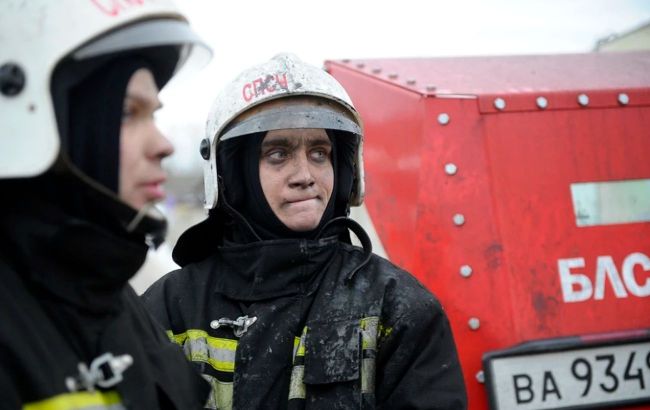Massive drone attack on Russia: Russians have 'no losses' again
 Massive drone attack on Russia occured on the night of August 30 (Photo: rosmedia)
Massive drone attack on Russia occured on the night of August 30 (Photo: rosmedia)
Russia announced tonight about the most massive drone attack. Unmanned aerial vehicles targeted six Russian regions and the temporarily occupied city of Sevastopol.
In Pskov, Il-76 planes were destroyed
Around 23:40 local time, a series of explosions occurred at the Russian airport in the city of Pskov (about 700 km from Ukraine).
Local Telegram channels reported that 12 UAVs allegedly attacked the airport. Witnesses complained about the sounds of gunfire, and local authorities declared an anti-terrorism plan named Edelweiss (a regime when security forces are put on high alert with combat weapons).
Later, Russian media extensively reported that the attacks on the Pskov airport damaged four military transport aircraft Il-76 (used for transporting personnel, equipment, and ammunition), with two of them on fire. So, it might involve damage to a total of 6 units.
Russian "war correspondents" wrote that these Il-76 aircraft were serving the 76th Guards Airborne Assault Division. Its personnel were stationed in Bucha in the spring of 2022.
The Pskov International Airport is a joint base with the symbolic name Kresty, and it falls under the jurisdiction of the Russian Ministry of Defense. The 334th Aviation Regiment is based there. Immediately after the strikes, three to five aircraft were "evacuated" from the airport.
The media paid attention to previous satellite images, which suggest that the Il-76 planes in Pskov were densely positioned without cover, so the actual losses in equipment could be higher.
Meanwhile, local authorities are trying to hide the real consequences of the attack. The Governor of Pskov region, Mikhail Vedernikov, claims there are supposedly no casualties due to the strikes.
Despite such statements, the Pskov airport still had to be closed. All eight scheduled passenger flights for today were canceled.
According to "Rosaviation," all air transport facilities supporting flights and the Unified Air Traffic Management System "operate normally."
According to Pskov media, a military unit of 64044 - the 2nd GRU Special Forces Brigade - also caught fire due to the attack. It is located near the airfield.
At the same time, Russian propagandist Telegram channels mention the possible damage to the Tu-22 bomber.
Attack on one of the largest microelectronics plants in Bryansk
The Bryansk region was also attacked multiple times that night. According to Governor Alexander Bogomaz, three drones were allegedly "shot down," and there were supposedly "no casualties."
However, several Russian sources reported a fire on the premises of the "Kremny EL" plant. It is one of the largest microelectronics manufacturers in Russia.
The agency "Important Stories" notes that 94% of the company's production in 2017 was produced for the needs of the Russian Ministry of Defense. The plant serves the corporations "Almaz-Antey," "Aerospace Equipment," "Vega," and "Suzirya."
The plant also produces components for the Pantsir air defense systems and the Iskander missile complexes.
Over the Radyansky district of Bryansk, another UAV was shot down - its fragments damaged the building of the Investigative Committee, shattering windows. Initially, local authorities wanted to keep the incident quiet but eventually confirmed the information.
Additionally, two drones attempted to attack a TV tower in Bryansk Oblast. At least six drones were registered in the region during the night.
Drones attempted to attack the petrochemical plant near Kaluga
In the Kaluga region, a total of three drones were registered. The Russian Telegram channel Shot, citing its sources, claims that drones allegedly "tried to attack the largest petrochemical plant TOV "First Plant."
Supposedly, around 2 a.m., a drone fell "into an empty reservoir for storing petroleum products" on the company's premises in the Dzerzhinsky district.
However, there were consequences. Despite the so-called "empty" tank, a pipeline caught fire. Around the same time, enemy air defense allegedly shot down a drone in the village of Pishchalovo—a 7-meter crater formed at the crash site.
As per traditional Russian media reports, there were no casualties in either incident.
In Moscow and several regions, they announced the "Kover" ("Carpet") plan
During the night, the "Kover" plan (which means awaiting an attack) was also implemented in Moscow, Tula, and Ryazan regions.
In Moscow, UAVs were supposedly "grounded" using electronic warfare equipment. After that, as told by the Moscow Mayor, Sergey Sobyanin, the UAV crashed into a tree in the village of Lukino in the Ruza district.
As a result of the explosion, windows were shattered in nearby buildings, and a fence was damaged.
Furthermore, in the Oryol region, two UAVs were allegedly shot down. One drone was downed over the Khotinetsky district, and the other over the Mtsensk district.
Meanwhile, in the Ryazan region, supposedly two UAVs were destroyed. One was allegedly downed about 11 kilometers from the Dyagilevo airfield at 3 a.m., and the other around 4 a.m., approximately 7 kilometers from the airport.
Local authorities report that both drones were "successfully shot down" using the Pantsir anti-aircraft missile system.
"Operation of sea drones" in occupied Sevastopol
In addition to Russian regions, the occupiers were uneasy in the captured city of Sevastopol.
Explosions were heard in the area of Sevastopol Bay. The so-called "head" of the city, Mikhail Razvozhaev, announced that the forces of anti-submarine and sabotage support were "repelling attacks from the sea" by drones.
Later, he claimed that the "anti-submarine and sabotage support operation in the waters had ended." He did not provide any details about the attack.
Shoigu's reaction
Traditionally, in response to the drone attacks on Russia, the Russian Ministry of Defense blamed the so-called "Kyiv regime." Allegedly, the attack was "halted" everywhere, but for some reason, Shoigu remained silent about the raids on Pskov.

